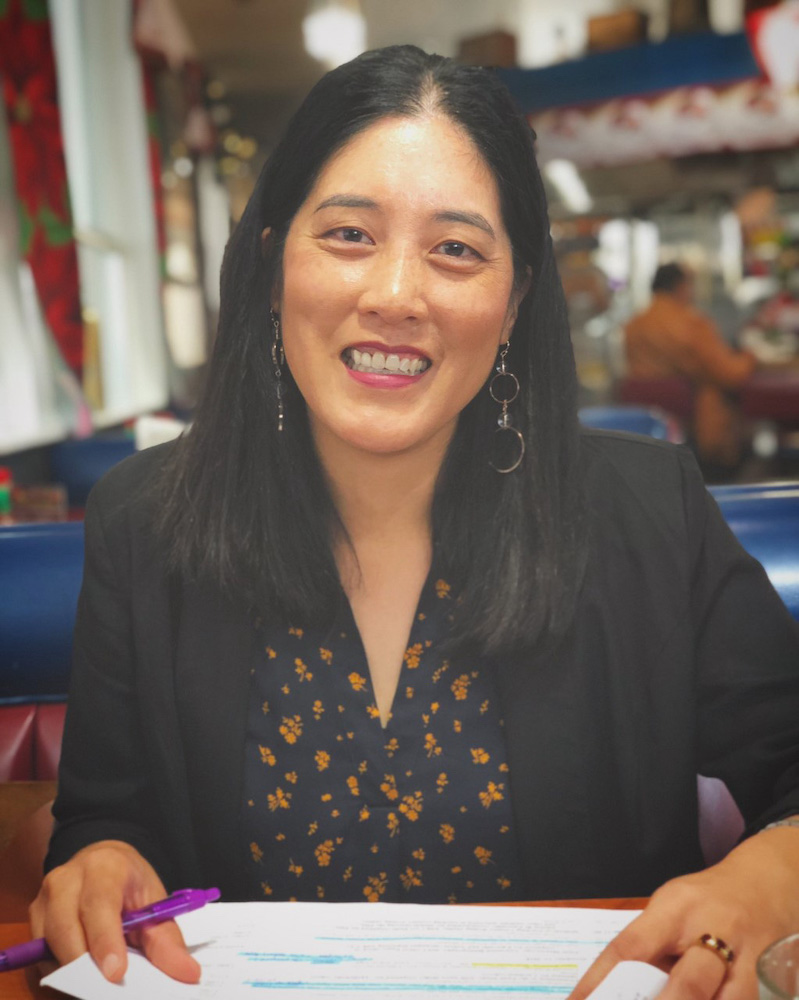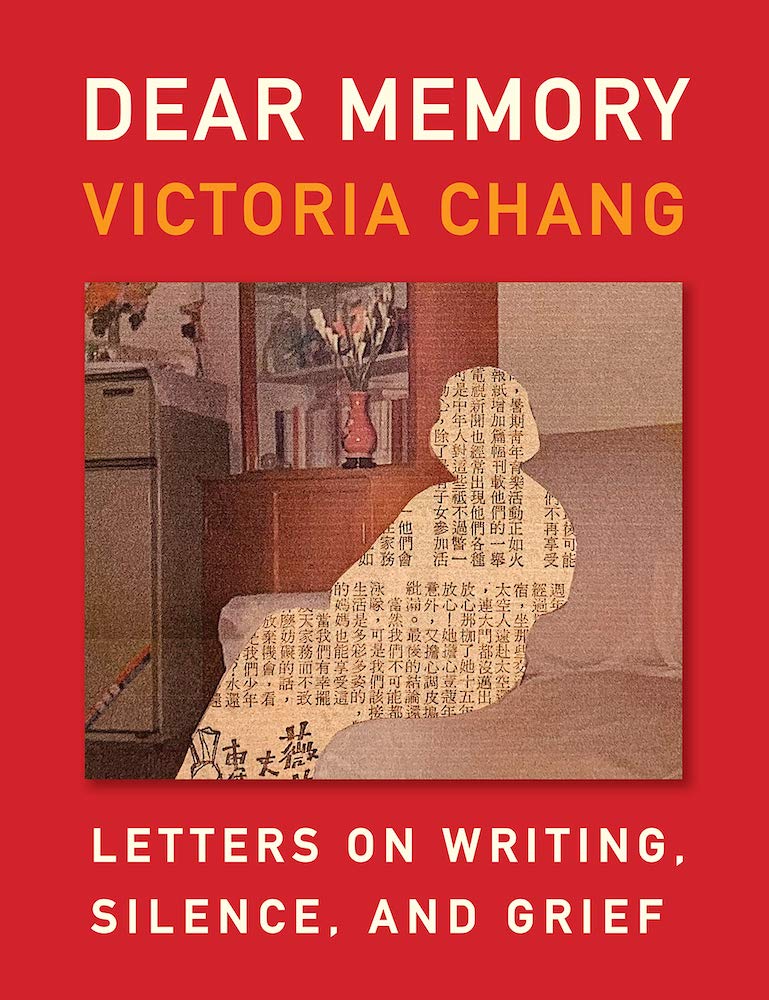The PEN Ten: An Interview with Victoria Chang
The PEN Ten is PEN America’s weekly interview series. This week, Viviane Eng speaks with Victoria Chang, author of Dear Memory: Letters on Writing, Silence, and Grief (Milkweed Editions, 2021) – Amazon, Bookshop.

Photo by Isaac Fitzgerald
1. Where was your favorite place to read as a child?
At the local library in West Bloomfield, MI.
2. How does your writing navigate truth?
Can truth be navigated? Hmm, interesting question. I’m interested in philosophy, art, and criticism, so maybe my writing may live in these spaces and their intersections.
3. Which writer, living or dead, would you most like to meet? What would you like to discuss?
Dead would definitely be Virginia Woolf or Gertrude Stein (I would love to go to one of her salons). I’d like to go on a road trip with Elizabeth Bishop.
Living would be Jorie Graham or Anne Carson. What I would do with all of them is to just listen. But mostly, I’d love to meet some visual artists and just talk about their art. A whole slew of visual artists come to mind. I just saw the Joan Mitchell exhibition at the SFMOMA and watched a short video of her talking about her art—I think that’s one of my favorite things to read or do: talk to artists about their process, their views on art, etc.
“For the things I’m working on now, I am really trying to please myself, and that is always very hard because I have very high standards and can be very demanding! But I like that I am trying to first and foremost satisfy myself as a reader and writer—that feels like a very honest and pure writing process.”
4. What’s something about your writing habits that has changed over time?
I don’t really have writing habits because my schedule is so chaotic and always has been. I really need to change how chaotic it is and was just texting a friend this morning, and we were both telling each other we need to do a Rilkean overhaul of our lives: “You must change your life!” It would be a dream to have a writing habit.
Currently, I have been writing for about 30 days straight, almost daily. This was a necessary Rilkean moment when I decided to do this—it was to start writing or have a breakdown.
5. What’s a piece of art (literary or not) that moves you and mobilizes your work?
I’m working on something now, but I don’t want to jinx talking about it because once I start talking about it, it will mean it’s real and then it can no longer just be some experimental bad writing that I’m doing. It will have standards associated with it! But I am working on something related to what you’re talking about.
I would say that visual art has always been something that moves and mobilizes my work because I think I originally started out wanting to be a visual artist or perhaps not wanting to be, but just drawing and painting.
“Often if I wait long enough, which isn’t usually by choice, but living and growing older, reading, and time, can lead to interesting things in poems. The interesting paradox is that looking at my writing from the outside, they might seem preconceived, but they aren’t really.”
6. Some writers write with a specific reader in mind. This may be an individual, a group of people, a memory. Who or what do you envision as the reader, as you are writing?
When I’m writing/drafting, I’m not sure if I’m thinking of a reader. For what I’m working on now, I think about what I would want to read, or what I may be interested in, or what I might need. I do know that when I was writing Obit, I was very much so writing to myself—or someone like myself—and also writing to an imaginary friend sitting across from me to see if I could explain how I was feeling in language to this imaginary person.
For the things I’m working on now, I am really trying to please myself, and that is always very hard because I have very high standards and can be very demanding! But I like that I am trying to first and foremost satisfy myself as a reader and writer—that feels like a very honest and pure writing process.
 7. In Dear Memory, you cite Valzyhna Mort, who once said, “Lacking language is the beginning of a poem to me.” You write that this statement resonates with your own creative process as well. What’s the catalyst that transforms speechlessness or voicelessness into words on a page?
7. In Dear Memory, you cite Valzyhna Mort, who once said, “Lacking language is the beginning of a poem to me.” You write that this statement resonates with your own creative process as well. What’s the catalyst that transforms speechlessness or voicelessness into words on a page?
I was talking to a couple of students yesterday, and both of them talked about their “ideas” for their poems and I wondered how many people start poems or books of poems with ideas. I really like what Mort said because I like to write that way: start a poem with no preconceived notions, and then the poem can twist and turn in whatever way it wants. I think that’s the thing—there’s no catalyst. You just sit down and move the hand and whatever happens happens.
Often if I wait long enough, which isn’t usually by choice, but living and growing older, reading, and time, can lead to interesting things in poems. The interesting paradox is that looking at my writing from the outside, they might seem preconceived, but they aren’t really.
8. I really liked what you said about different literary works having their own distinctive characteristics: “Each book isn’t just a book, but a period of life, a period of learning how to write. Each book has its own hair color, its own glasses, its own favorite mug, its own computer, its own shirt and pants, its own tears.” If Dear Memory could walk, talk, and gesticulate, who would it be? Would its identity change over time, as memories and the significance of those memories sometimes do?
If Dear Memory could walk, talk, and gesticulate, it would be a melancholic Victoria Chang who was trying to speak to the dead and make sense of other people’s lives through documents. That period of my life was very hazy and this book was hard to make, so frankly, I’m glad it’s over. The whole thing was one weird evolving experiment.
“If Dear Memory could walk, talk, and gesticulate, it would be a melancholic Victoria Chang who was trying to speak to the dead and make sense of other people’s lives through documents.”
9. You were the recipient of the 2021 PEN/Voelcker Award for Poetry, which honored your extraordinary poetry collection Obit. How has receiving public recognition of your work affected your writing?
I was beyond honored to receive this award, especially after seeing who the judges were (Sherwin Bitsui, Cynthia Cruz, Terrance Hayes, Claudia Keelan, and Bao Phi). It’s an extraordinary honor to be recognized by your peers, particularly ones that you admire.
The public recognition of my work has frankly been jarring. I prefer anonymity and have grown accustomed to that way of living. It’s been an adjustment, and I will say honestly that things have gotten enormously busy—so much so that I’ve had some challenges managing my own time and mental health. But I’m so pleased for the writing—the writing is what I would love people to connect with. If I could separate myself from the writing and disappear, that would be ideal.
10. With this in mind, you also write that you once knew little about how “both writing and publishing could be relentlessly unforgiving.” I think many writers and industry professionals would probably agree with you! In the last year and change, so many writers have called for reforms within the publishing industry, in regards to everything from racialized pay disparity to transparency about who holds the power in publishing. As a writer, what are some changes that you think those in the literary world should consider, in order to make writers feel more supported?
I think people are already asking for changes, more transparency, more diversity, etc. So I think a lot of good changes are already happening. It hasn’t all been easy, obviously. I think if we can all remember to have grace, generosity, and empathy during these difficult processes of change, things will continue to improve.
Victoria Chang is the author of Dear Memory. Her poetry books include Obit, Barbie Chang, The Boss, Salvinia Molesta, and Circle. Obit received the Los Angeles Times Book Prize, the Anisfield-Wolf Book Award, and the PEN/Voelcker Award; it was also a finalist for the National Book Critics Circle Award and the Griffin Poetry Prize, and was longlisted for the National Book Award. She is also the author of a children’s picture book, Is Mommy?, illustrated by Marla Frazee and named a New York Times Notable Book, and a middle grade novel, Love, Love. She has received a Guggenheim Fellowship, a Sustainable Arts Foundation Fellowship, the Poetry Society of America’s Alice Fay Di Castagnola Award, a Pushcart Prize, a Lannan Residency Fellowship, and MacDonwell Colony’s Katherine Min Fellowship. She lives in Los Angeles and is the program chair of Antioch University’s low-residency MFA program.






